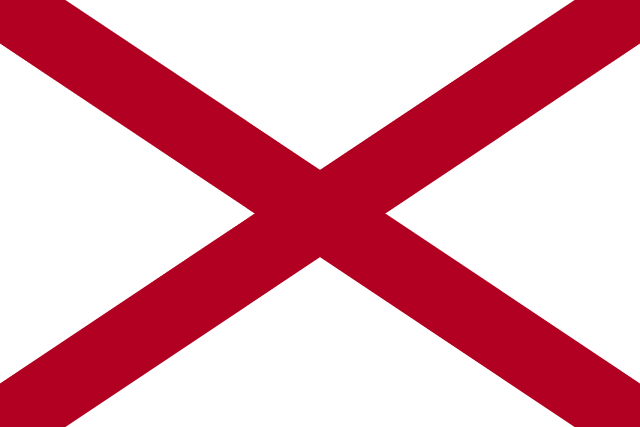State of Alabama
Nicknames: Heart of Dixie, Yellowhammer State, Cotton State
Motto(s): Audemus jura nostra defendere (We dare defend our rights)
Date of Statehood: December 14, 1819 (22nd state)
State Song: “Alabama” by Julia Tutwiler, composed by Edna Gockel Gussen
Alabama Flag History
The flag of Alabama, known for its simplicity and strong historical significance, features a crimson cross of St. Andrew on a white field. This design, officially adopted in 1895, symbolizes courage and sacrifice. The cross harkens back to the Confederate battle flag, reflecting Alabama’s Civil War history. Despite its simplicity, the flag’s symbolism is deeply interwoven with Alabama’s identity.
The choice of colors, crimson and white, is intentional. Crimson represents valor and bravery, a nod to the state’s involvement in the Civil War. The white background symbolizes purity and the quest for justice. Since its adoption, the flag has undergone minimal changes, making it a lasting emblem of Alabama’s heritage.
The flag’s inception dates back to February 16, 1895, when it was officially adopted. Unlike many states whose flags have undergone several redesigns, Alabama’s flag has remained largely unchanged, standing as a testament to the state’s respect for its traditions and history. This reverence for the past is a cornerstone of Alabama’s cultural identity, embodied by the enduring nature of its state flag.
Alabama Quick Facts
Capital City: Montgomery
Abbreviation: AL
Population: Approximately 4.9 million
Region: Southeast, Deep South
Origin of State Name: Derived from the Alabama River, itself named after the Native American tribe that inhabited the region.
Sports Teams: No major professional sports teams, but a strong college sports presence, notably the University of Alabama and Auburn University football teams.
Bordering States: Tennessee, Georgia, Florida, and Mississippi
Area Codes: 205, 251, 256, 334, 938
Highest Point: Cheaha Mountain (2,413 feet or 735 meters)
Lowest Point: Gulf of Mexico
Geography of Alabama
Area: 52,420 square miles (135,767 square kilometers), 30th largest
Land: 50,645 square miles (131,171 square kilometers), 28th largest
Water: 1,775 square miles (4,597 square kilometers), 23rd largest in terms of water area
Coastline: 53 miles (85 kilometers), 23rd longest
Shoreline: 600 miles (965 kilometers), including bays, lagoons, and islands, 23rd longest
Largest Cities:
- Birmingham
- Montgomery
- Mobile
- Huntsville
- Tuscaloosa
- Hoover
- Dothan
- Auburn
- Decatur
- Madison
- Florence
- Gadsden
- Vestavia Hills
- Prattville
- Phenix City
National Parks:
- Horseshoe Bend National Military Park
- Little River Canyon National Preserve
- Russell Cave National Monument
- Tuskegee Airmen National Historic Site
- Tuskegee Institute National Historic Site
Alabama State Symbols
Living Insignia
State Bird: Yellowhammer (Northern Flicker)
State Animal: Black Bear
State Amphibian: Red Hills Salamander
State Butterfly: Eastern Tiger Swallowtail
State Fish: Largemouth Bass
State Flower: Camellia
State Horse Breed: Racking Horse
State Insect: Monarch Butterfly
State Mammal: West Indian Manatee
State Reptile: Alabama Red-bellied Turtle
Inanimate Insignia
State Fruit: Blackberry
State Gemstone: Star Blue Quartz
State Soil: Bama Soil Series
State Tree: Longleaf Pine
State Quarter: Issued in 2003 featuring Helen Keller with the slogan “Spirit of Courage”
State Beverage: Conecuh Ridge Whiskey
State Colors: Red and White
State Dance: Square Dance
State Food: Pecan
State Fossil: Basilosaurus cetoides
State Mineral: Hematite
State Rock: Marble

